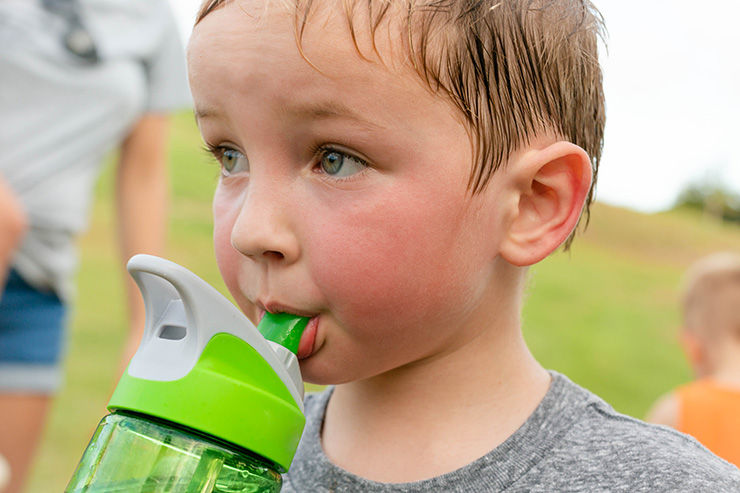The Importance of hydration during the Australian Summer
- OSCAR Care Group

- Feb 21, 2023
- 6 min read
Updated: Nov 13, 2024
Who doesn’t love an Aussie summer?! Daylight savings, warm balmy nights, backyard cricket with the family and ice cream days at the beach. . . it truly is the best time of year! However, as we’re enjoying the warmer weather, it is important to know how to keep yourself and those around you properly hydrated.
Like many medical conditions, dehydration is not one to discriminate and is a threat to all people. Yet, infants, babies and young children, chronically ill people and the elderly are at increased risk, particularly during periods of severe heat and humidity. This summer, let’s aim to be more aware of fluid intake amongst our junior population and make sure they can hydrate to feel great!

The Role of water in the human body
Making up approximately 60% of the total human body, it is no surprise that water is present and involved in every organ, tissue and cell. All chemical processes take place in water, it forms blood, urine and faeces, it regulates our body temperature through sweat, aids in digestion, lubricates our joints, moisturises our skin and even dissolves vitamins and nutrients to make them accessible by the body…. you can see why it is so important!
Unlike camels who can store water in their humps, the body has no way to store water and therefore, we need to get it from our food and fluids each and every day. The amount of water we lose each day varies based on our age, activity level and environmental factors (such as temperature and humidity), however the average adult loses between 2.5-3 litres a day!
Dehydration
When your body is depleted of too much fluid, dehydration occurs. Lifestyle, environment and physical factors such as acute illness, accessibility to fluid and climate all play a role in the onset of dehydration and it can show in different ways.
Symptoms to look out for include:
Feeling thirsty
Headaches/light-headedness
Dry mouth, skin and /or cracked lips
Reduced urine output and/or dark coloured urine (fewer wet nappies in infants)
Constipation
Fatigue and lethargy
Irritability and mood changes
If severe, dehydration can also lead to collapse and can be fatal. If you or a child in your care is showing clinical signs of dehydration, it is vital to seek urgent medical attention.
How much fluid is enough?
With all this fluid loss, there needs to be replacement and the amount you need is determined by different factors such as:
Age
Gender
Physical activity level
Pregnancy and/or breastfeeding
Lifestyle and environment (such as weather etc.)
Medical conditions
Due to the unique variation in all peoples physical and environmental factors which continue to change daily, there is no set guideline on the amount of fluid needed each day. The Australian Dietary Guidelines however have recommended an Adequate Intake (AI) level of fluids for the Australian population. An AI is the average nutrient level consumed by a typical healthy population that is assumed to be adequate to maintain health. Again, this is no set rule, but should be used as a guide to ensure fluid requirements are being met each day. For infants, children and adolescents, the guidelines are as followed:
What counts as fluid?
The Australian Dietary Guidelines recommend most of our daily fluid intake to be made up of plain water (except for breast/formula fed infants). It is important to note that the AI values also represent total fluids from all foods and beverages. All fluids including milk and milk-based drinks, tea, coffee, fruit juice, sports drinks, flavoured water, vitamin-style water, soft drink and cordial are counted as part of the daily fluid intake.
Food can also be a great source of fluid. Surprisingly, most foods (even those that appear dry) contain a portion of water and can provide about 20% of our total fluid requirements. Food items such as juicy fruits (watermelon, strawberries, oranges), vegetables (cucumbers, tomato, celery, lettuce), soups, yoghurt, custard, soft cheeses (ricotta/cottage), ice cream, icy-poles, jelly, sauces and gravies are some examples.
Do infants need to drink water?
The Australian Dietary Guidelines state that infants who are exclusively breast-fed do not require supplemental water. Approximately 87% of breast milk is water which is enough to meet the hydration needs of infants. The same recommendation is for those on infant formula as it is prepared using water. Should an infant be struggling with feeding or there is not enough supply of breastmilk/formula, medical attention should be sought immediately, and fluids may need to be administered intravenously to prevent dehydration.
Is water the only option to increase hydration in children?
Plain water is the best way to hydrate your body as it is non-caloric (meaning it doesn’t provide any energy), sugar-free, fat-free, accessible and affordable.
Milk is another great choice for infants and children as it is a nutritionally complete fluid source. Milk offers protein for growth and development, fat and carbohydrate for energy production, calcium for strong bones and teeth as well as an abundance of micronutrients (vitamins and minerals) and a source of fluid. Children <2 years of age should be provided full cream varieties due to their increased demand for fat which supplies energy for their rapid growth. After 2 years of age, the recommendation is to switch to low-fat or skim varieties and the growth period slows down.
Infants and children do have a fondness to milk; however, it should be given only in moderation as part of a balanced diet as filling up on milk limits their intake of other foods. The advice is not to exceed more than 500mL per day.
Although still contributing to total fluid intake, soft drinks, sports drinks cordial and fruit juice contain lots of sugars (both naturally occurring in fruit juice and commercially added in cordials, sports and soft drinks) and excess energy which can impose negative consequences on health of infants and children. Research has shown links between the intake of sugar-sweetened beverages and the development of weight gain and obesity, poor oral health (tooth decay and erosion) and influence on food behaviours and preferences, resulting in a liking for sweet things, poor appetite and fussy eating.
Factors affecting fluid intake in children
As we now know, the body needs enough fluid to be able to maintain optimal function and performance. Children sometimes don’t have the appeal to drink lots of water, they might dislike the bland taste of it, are too busy playing to think about drinking, have limited access and availability of water during the day or may have restricted self-efficacy and self-control. Parents, caregivers and early childhood educators have an important role in monitoring fluid intake and encouraging greater intake as necessary.
Be sure to think about fluid requirements changing during times of illness, warm weather and high exercise.
How can you increase fluid intake?
Carry a water bottle pop one in your child’s school bag, leave it on a desk or table at care, school or home, pack a child a water bottle during long car trips or outings, keep a bottle on their bedside table at night.
Serve water in jugs or bottles when eating whether it be during a meal at childcare or dinner at home, water should always be available at mealtimes.
Eat it! – add lots of vegetables to meals, snack on fruits and yoghurt or make a smoothie.
Chill it down during warmer weather, serving cold water from the fridge, adding ice cubes or freezing water can provide relief.
Making water interesting Plain water is off-putting to some but can be easily jazzed up and made interesting by adding flavourings. Try infusing and flavouring plain water by adding slices of citrus fruits (such as lemons), fresh berries, cucumber, herbs (like mint) and even cold tea bag infusions. Avoid added sugars or artificial flavourings such as cordial.
Hydration education and accessibility to water
Make hydration part of your nutrition education to children and young people. You may wish to educate children as to why fluids are important before they go outside to play and why they should have a drink afterwards. Encourage them to listen to their thirst sense and model good behaviour by drinking from your own glass or bottle of water.
Ensure fluids are easily accessible in the home and throughout care centres – whether that be through water fountains and filtered water taps or water coolers as a place where children can fill up their drink bottles.
Where to go for more information?
For more information about fluids and hydration for infants and young adults, seek out advice from your healthcare professional and contact an OSCAR Care Group Accredited Practising Dietitian (APD) for further support, advice, tips, and tricks.
Our Dietitians assist Childcare centres with education sessions, menus, recipes and more. As well as our Team is available for one-on-one support through our clinic.
We're here to help you!


